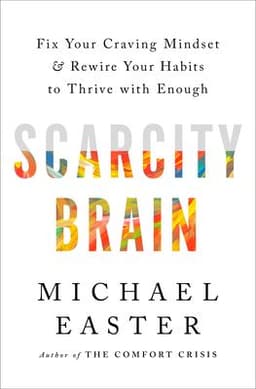
Scarcity Brain Book Summary
Fix Your Craving Mindset and Rewire Your Habits to Thrive with Enough
Book by Michael Easter
Feeling Lazy?Read 1 Minute Summary
Summary
In a world of abundance, our ancient scarcity-wired brains keep us trapped in self-defeating loops of "more" - but by recognizing these patterns and deliberately choosing "enough," we can find deeper fulfillment.
Sign in to rate
Average Rating: 5
The Scarcity Loop: A Powerful Behavior Pattern
The scarcity loop is a three-part system that powerfully drives behavior:
- Opportunity - An opportunity to get something of value that improves our life, but with risk of not getting it.
- Unpredictable Rewards - Not knowing when or how much of the reward we'll get, which excites the dopamine system and makes us crave it more.
- Quick Repeatability - The behavior can be repeated quickly in rapid succession, compelling more action.
The scarcity loop evolved to help our ancestors persist in finding scarce food and resources. But now it's being used in slot machines, social media, shopping, and more to drive counterproductive habits.
Section: 1, Chapter: 1
Si Redd Revolutionizes Slot Machines
In the 1970s, slot machines were unpopular - over 97% of plays lost, so people quickly stopped playing. But slot machine designer Si Redd used screens to allow multiple betting lines (increasing win frequency to 45%) and near misses (encouraging replay).
He also added exciting sounds/graphics and a Spin button for faster play. This optimized the scarcity loop in slot machines - providing opportunity, unpredictable rewards, and quick repeatability. Redd's machines were a hit, expanding to most casino floors and increasing revenues tenfold. His insights shaped the modern slot machine industry.
Section: 1, Chapter: 1
The Scarcity Loop Is Embedded In Many Modern Technologies
The scarcity loop is now used in many digital products and services to influence behavior, including:
- Social media: Posting/scrolling for unpredictable likes, comments, shares
- Email: Checking for variable rewards of good/bad/neutral messages
- Online shopping: Searching for deals, gambling on quality of purchase
- Mobile gaming: Playing for unpredictable in-game rewards and progress
- Dating apps: Swiping for the uncertain reward of matches
- Gig economy apps: Incentivizing workers with unpredictable payouts
Section: 1, Chapter: 1
Laboratory Pigeons Reveal The Power Of The Scarcity Loop
Experiments by psychologist Thomas Zentall show that pigeons will consistently choose a "gambling" game that provides less food overall, mimicking the human slots players Si Redd observed.
When pigeons can choose between:
- A "sure thing" game providing a medium food reward 50% of the time, or
- A "gambling" game with a larger food reward only 20% of the time
An overwhelming 96.9% of pigeons prefer the "gambling" game, even though it provides less food! The larger unpredictable reward taps into an instinctual attraction to variable payouts. This behavior is seen across many animals.
Section: 1, Chapter: 2
Dopamine Drives Pursuit Of Unpredictable Rewards
Dopamine has long been misunderstood as the "pleasure chemical." In reality, dopamine release motivates us to pursue rewards, especially when they are unpredictable.
When an outcome is unsure, our dopamine levels spike - causing intense focus, craving and anticipation as we await the result. This happens when waiting to see if we got likes on a post, matches on a dating app, a gambling payout, and so on.
Dopamine evolved to make us "obsessive" about persisting for unpredictable payoffs related to survival. Today, the neurochemical still pushes us to keep checking, scrolling, swiping and pulling the metaphorical slot handle - even when the reward is trivial or counterproductive.
Section: 1, Chapter: 2
The Scarcity Loop Is A Key Cause Of Addiction
For someone struggling with substance abuse, just the possibility of getting their drug of choice puts them in a powerful scarcity loop. Obtaining the drug comes with a moment of suspense - will they find it this time? How pure will it be? That uncertainty is exciting, making the high more intense and the behavior more likely to be repeated.
If you or someone you know has an addiction, look for ways to:
- Reduce access to the substance
- Make consumption more predictable and less exciting
- Satisfy the underlying need the drug fulfilled in a healthier way
Section: 1, Chapter: 2
The Internet Overloads Us With Information While Limiting Real
Today, the internet provides an endless flood of novel information - accessible with minimal effort and no real danger.
However, this easy access to data doesn't necessarily lead to true understanding. Skimming headlines and posts designed to hijack our attention often leaves us more anxious and fragmented.
To use the internet mindfully and aid real comprehension:
- Limit reflexive clicking on clickbait that provides surface-level "information rewards"
- Aim to engage with primary sources (research, in-depth journalism) vs hot takes
- When you have a hunch you've been misled by an oversimplified take, challenge it by researching alternative viewpoints
Section: 1, Chapter: 3
NASA Astronaut Reflects On The Overview Effect And Its Implications
"After my first mission on the station, I would have said that you can't see the stars very well from the space station, because we have too many lights on inside...But then I started coming up here a half hour before everyone else would wake up. And I'd shut off the lights and just sit with my eyes open and sort of meditate, not trying to think about much, but rather just trying to soak it in...Space actually isn't the inky black that I described to people after my first mission. It seemed to me that the stars we normally see as individual stars weren't really that way. I could start picking up the faint stars super far away. There were so many of them that it seemed more like shades of gray and white and black. It was more of a texture, a net. And that changed how I think about perception, the limits of human knowledge, and how we have so much more to explore."
Section: 1, Chapter: 3
Humans Naturally Add Rather Than Subtract To Solve Problems
When an engineer was bested by his 3-year-old son in a bridge-building challenge, he realized humans overlook subtraction as a problem-solving strategy. The father tried to fix a lopsided bridge by adding more blocks to the short column. His preschooler intuitively removed blocks from the taller column instead.
Experiments show that even when subtraction is the best solution, people default to adding. We tend to add more:
- Lego blocks to stabilize a structure
- Features to a mini-golf hole or product
- Words to an essay
- Items to a travel itinerary
- Even when instructed to improve the situation with "as few moves as possible"!
Section: 1, Chapter: 4
The Tsimane Tribe Enjoys Shockingly Healthy Hearts Through Simplicity
The Tsimane tribe of the Bolivian Amazon has the lowest rates of heart disease ever measured - an astounding 5 times lower than Americans'.
A whopping 90% of tribe members aged 40-94 had completely clean arteries. In contrast, nearly 50% of Americans have some coronary artery disease by age 40-50.
The Tsimane secret? A diet based on:
- Unprocessed carbohydrates (70% of calories)
- Lean animal protein and fish (25%)
- Fruits and vegetables (5%)
Section: 1, Chapter: 5
Ultraprocessed Foods Disrupt Satiety And Make Us Eat More
"We found that people ate the ultra-processed meals a lot quicker...This could be because the Tsimane foods led the participants' brains to pump out more of a hormone called PYY, which reduced their appetite. They also decreased a hormone called ghrelin, which made them hungry. The Tsimane foods even took more work to physically chew. The ultra-processed diet, meanwhile, did the opposite. It cut those natural brakes that help us find enough." - Kevin Hall, Researcher
Section: 1, Chapter: 5
Stuff Accumulates Because We Struggle To Know "Enough"
The average American home has tripled in size since 1970 and now contains over 300,000 items. We have entire industries to manage this excess: storage units, professional organizers, decluttering experts.
Clutter creeps up because, unlike with food or drink, we have no physical signals of "too much." There is no equivalent to feeling stuffed for material goods. Compulsive shopping taps into the scarcity loop - there's an addictive rush to scoring unpredictable deals. Filling our space with objects provides temporary soothing and sense of control.
To escape the stuff cycle, we must consciously define "enough" based on our true values.
Section: 1, Chapter: 6
Think "Gear Not Stuff" To Develop A Healthier Relationship To Things
Today's abundance makes it easy to accumulate clutter we don't truly need. One way to interrupt this pattern is to think of possessions as "gear" that helps you achieve a purpose, rather than "stuff" you passively own.
Gear is:
- Directly useful and relevant to your goals/hobbies
- Built to last
- Purchased thoughtfully and used regularly
Stuff is:
- Rarely used or irrelevant to your purpose
- Bought on impulse or to fill an emotional void
- Neglected or stored out of sight
Section: 1, Chapter: 6
Our Drive For Social Status Is Rooted In Evolution
Humans are wired to vigilantly track our social status because historically, more influence meant better odds of survival and reproduction. Higher-status individuals had:
- Access to more resources and mates
- A greater ability to win conflicts
- Power to make others do unpleasant tasks
- More trust and cooperation from the group
Status considerations influence our behavior more than we realize. For many, perceived social rank matters more than money, health or family obligations. Our craving for importance is a key driver of violence, risk-taking, overwork, and conspicuous consumption.
Section: 1, Chapter: 7
Social Media Supercharges Status-Seeking and Transforms "Status Emotions"
Our drive for social status evolved when we lived in small hunter-gatherer bands. There were tight limits on how many people we could influence and what types of status we could achieve.
Social media removes those limits. This has transformed the nature of pride and shame. We can advertise a prideful moment far and wide - but if our boast crosses a line, the shame of cancellation is equally amplified.
When posting, aim for authentic pride (celebrating a genuine achievement) vs hubristic pride (boasting to look better than others).
Section: 1, Chapter: 7
Our Cognitive Biases Warp How We See Our Social Standing
"When we perform a task in front of others, we believe we're being judged far more harshly than we are. We also think people take single moments of our lives and make sweeping generalizations.
...
We're laughably wrong. The scientists found that most people aren't all that judgmental and quickly forget single errors. But because we overblow the implications of every social move we make—because we believe that everyone cares so deeply about our every public action—it causes us anxiety and stress."
Section: 1, Chapter: 7
In Debates, Aim To Understand, Not "Win"
Our desire for social status can warp everyday interactions. We often use "cognitive biases" - like assuming others' mistakes reflect their character while giving ourselves a pass - to feel "right" and protect our ego.
This clouds our judgment, especially in disagreements. We overlook information that might change our minds. We get overconfident, assume the worst of the other side, and use any rhetorical tactic to defend our view.
In the moment, making our case feels good - like an "intellectual orgasm." But in the long run, it can damage relationships and our own growth.
Section: 1, Chapter: 7
The Modern Food Environment Hijacks Our Natural Drives
For most of human history, food was bland and scarce; They often didn't know where their next meal would come from. In this environment of scarcity, our brains evolved to release massive amounts of dopamine in response to rare tastes like sweet and fatty flavors, making us crave more.
Fast forward to today. Our food system is now abundant in cheap, convenient, and intensely flavorful options.
The result: We massively overeat. 60% of the American diet is now ultraprocessed foods optimized for overconsumption. 60% of adults and 30% of children are now overweight. And lifestyle diseases like diabetes, heart disease, and certain cancers are skyrocketing globally.
Section: 1, Chapter: 8
Every Culture Has Its Own Idea Of "Tasty" That Drives Overeating
In the U.S., a "bliss point" of sugar, salt, and fat defines deliciousness. But "tasty" is relative across cultures - and it's not always healthy:
- In the Middle East, Captagon (a type of meth) is considered a tasty treat. Its use is surging, ravaging communities.
- The Tsimane tribe of Bolivia finds plain chicken and rice delicious. But when they encountered the Western diet, rates of heart disease spiked.
- In Medieval times, European nobility gorged themselves on meat - a status symbol. Gout and heart attacks were badges of high status!
This suggests overeating is only partly driven by flavor. Deliciousness is a cultural construct - and often one at odds with health. In every time and place, we elevate foods that are scarce, expensive, or forbidden. When those foods become abundant, we struggle to regulate.
Section: 1, Chapter: 8
Highly Processed Foods Are Engineered To Be Impossible To Resist
Food doesn't just satisfy physical hunger - it also provides entertainment, pleasure, and emotional comfort. Ultraprocessed foods are expertly engineered to fulfill all those needs too well.
Compared to whole foods, highly processed products are hyperpalatable, calorie dense, quickly digested, and portable and long-lasting. To defend yourself:
- Aim for single-ingredient foods 80% of the time. Don't keep tempting ultraprocessed snacks in the house.
- Stick to a structured meal schedule. Don't graze all day - give yourself a chance to feel true hunger.
- Pile your plate with fiber-rich foods first - salad, fruit, whole grains. They keep you full on fewer calories.
- Beware of "health halos." Organic/vegan/keto junk food is still junk food!
Section: 1, Chapter: 8
Our Informational Scarcity Drove Us To Explore More Than Any Other Species
Humans are "informavores" - we crave knowledge just as much as food. This drive to explore the unknown led us to spread across the globe, mapping uncharted territory in search of resources and understanding. We evolved to find great reward in gathering new information, especially about our physical environment. Importantly, we also evolved to share that knowledge with others.
Today, the human exploratory instinct expresses itself in many ways - from space travel to scientific research to scrolling Wikipedia late into the night.
But our info-craving is now at odds with an info-glut. We're overwhelmed with data, not all of it reliable - or relevant. Learning to be selective and discerning in our "knowledge foraging" is a key challenge of the digital age.
Section: 1, Chapter: 9
The Internet Trains Our Brains For Shallow Information Processing
The internet is often heralded as a knowledge-seeker's paradise - an endless trove of facts, tutorials, and opinions to satisfy our every curiosity. But unfettered access to information isn't always helpful for true learning.
The end result is a "junk food" information diet that's momentarily satisfying but leaves us anxious - and still hungry for real insight. We must curate our "information nutrition" to feed our minds well.
Section: 1, Chapter: 9
Three Ways To Combat "Infobesity" And Hone Healthier Learning Habits
To make the internet work for you, not against you:
- Go straight to the source. The best way to deeply understand a topic is to seek out primary sources - original research, raw data, or firsthand experiences.
- Break free from "algorithmic conditioning." If you only click sensational headlines, social media platforms will keep serving them up. Consciously seek out nuanced, moderate perspectives to break the cycle. Curate a balanced "information diet"
- Prioritize experiential learning. No amount of googling can replace the visceral understanding that comes from visiting a new place, trying a challenging hobby, or having a heartfelt conversation with someone different from you.
Section: 1, Chapter: 9
Constantly Seeking Happiness Is A Recipe For Dissatisfaction
We've been taught to believe that happiness is an end state we can permanently achieve if we just optimize our lives enough. Psychologists are increasingly warning that pursuing happiness as a goal is self-defeating. The more we focus on chasing bliss, the more elusive it becomes.
The reasons are rooted in biology. For our ancestors, constant dissatisfaction was key to survival. As a result, our brains are wired to seek, not to rest content. We quickly adapt to our circumstances, good or bad, and reset our happiness baseline.
In the modern world, this means we often end up on a hedonic treadmill. We work crazy hours for a promotion, thinking we'll be happier with more money and status. The lesson? Happiness is found in the pursuit, not the prize. True satisfaction comes from appreciating the journey - not fixating on the destination.
Section: 1, Chapter: 10
We're Bad At Predicting What Will Actually Make Us Happy
Psychologist Dan Gilbert has spent his career studying "affective forecasting" - our ability to predict our future emotional states. His conclusion? We're terrible at it.
In one famous study, Gilbert surveyed assistant professors on their happiness level before and after a tenure decision. Those who got tenure were thrilled... but only temporarily. Surprisingly, those who were denied tenure also returned to their baseline happiness. Even though they'd predicted it would be a crushing blow, they found ways to cope and move on.
The problem, Gilbert explains, is that we're more emotionally resilient than we give ourselves credit for. Good or bad, we adapt to circumstances faster than we predict.
Section: 1, Chapter: 10
Monks Find Peace By Transcending The Self Through Service
Benedictine monks structure their lives around two core practices: prayer and work.
The monks see prayer not as a plea for divine favors but as a way to transcend the self. This radical acceptance of reality brings equanimity. When we let go of wishing things were different, we can find contentment in the moment.
For the monks, contemplation naturally flows into compassionate action. Work is seen as another form of prayer - a way to honor the divine by serving the community. Studies show that altruistic actions light up the brain's reward centers more than selfish ones. We're wired to find joy in generosity.
Section: 1, Chapter: 11
Happiness Is About Managing Expectations, Not Outcomes
"Between the poles of diseased and depraved is an expansive middle ground of experience and wisdom that can help explain why millions use [drugs and alcohol] to excess.
People use drugs for good reasons. Drugs are an easy way to escape, feel empowered, cope with life, and survive. Some hardworking Iraqis use drugs to stay awake and work longer hours.
I think that addiction is most often a function of circumstances...If the conditions are right and drugs are available, drug use rises. People use drugs for good reasons. Drugs are an easy way to escape, feel empowered, cope with life, and survive."
- Dr. Emad Abdul-Razaq
Section: 1, Chapter: 11
Aiming For A Consistent "Average" of Wellbeing Beats Chasing Constant Bliss
The problem with fixating on constant happiness is that it sets us up for disappointment. But if we expect to always feel amazing, we'll see dips as personal failures. Paradoxically, our pursuit of uninterrupted bliss ends up making us miserable.
A healthier approach is to aim for a high "average" of wellbeing over time. This means:
- Accepting that some negative emotions are normal and unavoidable. It's OK to just sit with them when they arise, without judgment.
- Savoring small, everyday moments of contentment - a good meal, a belly laugh with a friend, a beautiful view. These are the building blocks of a happy life.
- Pursuing long-term fulfillment over short-term pleasure. Investing in relationships, personal growth, and meaningful work pays dividends over time.
Remember, no one is happy all the time - not even the most Zen monks or carefree kids. What matters is the overall trend line.
Section: 1, Chapter: 11
Related Content
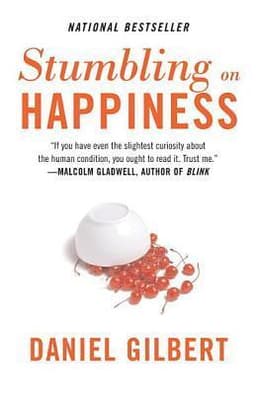
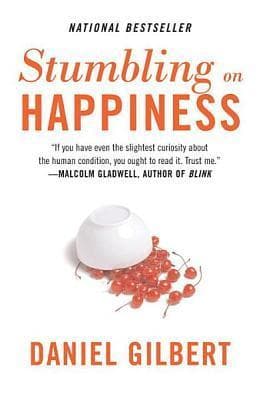
Stumbling on Happiness Book Summary
Daniel Gilbert
Harvard psychologist Daniel Gilbert takes readers on a whirlwind tour of the human brain, exploring how our unique ability to imagine the future often leads us astray in predicting what will make us happy. Gilbert argues that the futures we envision are often distorted by our current emotions, our flawed memories, and our psychological blind spots - but recognizing these limitations, we can learn to more accurately forecast our feelings and maximize our well-being.
Harvard psychologist Daniel Gilbert takes readers on a whirlwind tour of the human brain, exploring how our unique ability to imagine the future often leads us astray in predicting what will make us happy. Gilbert argues that the futures we envision are often distorted by our current emotions, our flawed memories, and our psychological blind spots - but recognizing these limitations, we can learn to more accurately forecast our feelings and maximize our well-being.
Happiness
Psychology
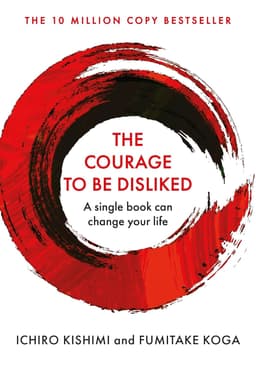
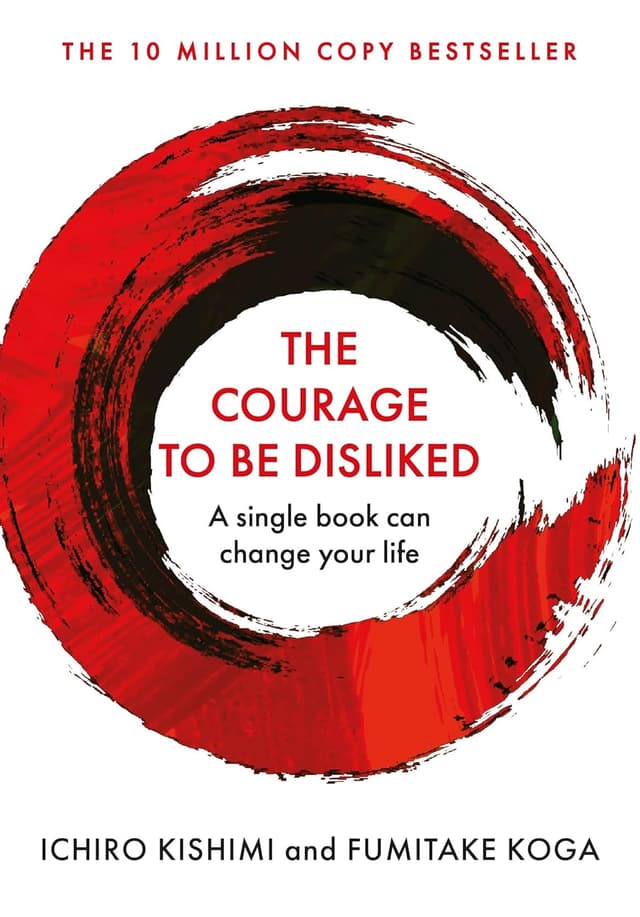
The Courage to Be Disliked
Ichiro Kishimi and Fumitake Koga
Through an illuminating dialogue, "The Courage to Be Disliked" reveals how Adlerian psychology empowers us to overcome the past, embrace our authentic selves, and find genuine happiness by courageously living in the present and contributing to others.
Through an illuminating dialogue, "The Courage to Be Disliked" reveals how Adlerian psychology empowers us to overcome the past, embrace our authentic selves, and find genuine happiness by courageously living in the present and contributing to others.
Personal Development
Happiness
Psychology

